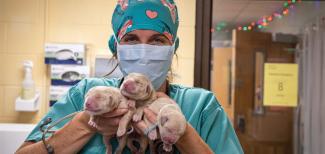Experienced breeders understand the importance of ensuring that a bitch is a good candidate for breeding. Over the nine weeks of pregnancy, they provide optimal care and vigilantly monitor for potential problems. Importantly, they partner with a veterinarian to guide them through all facets of breeding, pregnancy and delivery.
Veterinarians who specialize in reproduction, neonatology and genetic diseases are known as theriogenologists. With only about 400 board-certified theriogenologists in practice across the U.S. — and not all work in companion animal theriogenology — there is an indisputable shortage of these experts trained to assist breeders.
Helping to bridge the gap, a theriogenology residency program was introduced in 2014 by the Theriogenology Foundation, American Kennel Club and AKC Canine Health Foundation. Since then, the program has funded more than 10 residents providing $100,000 per resident to support their training.
Coordinator of the three-year theriogenology residency program at Virginia-Maryland College of Veterinary Medicine is Julie T. Cecere, DVM, MS, DCAT, clinical associate professor of theriogenology. Current theriogenology resident at Virginia-Maryland, Alyssa Helms, DVM, plans to practice in a private veterinary clinic when she finishes her residency in 2021
In the Virginia-Maryland referral practice, more than 50 percent of the dogs are from breeders involved in performance sports like field trials, coonhound nite hunts, agility, and obedience or are working canines trained for bomb detection, search and rescue, military service, and police dogs. Experience working with breeders has given Dr. Cecere great respect for breeders. “They teach us as much as we teach them,” she says.
Reflecting on best practices for dog breeders, they offer their perspectives on how breeders can help things go smoothly. Although nothing is guaranteed with breeding and delivering puppies, these guidelines provide worthy considerations.
Should a Bitch Be Bred?
“We advise breeders to have a breeding soundness exam to be sure a bitch is healthy and has no genetic conditions or abnormalities that would hinder her pregnancy. We also run through a prebreeding checklist that is important prior to breeding,” Dr. Cecere says.
“Generally for most breeds, a bitch is not developmentally or physically mature to be bred until she is around 2 years of age,” she continues. “However, for toy and small breeds, they may reach maturity as early as 18 months of age.”
How Often Should a Bitch Be Bred?
Back-to-back pregnancies can be OK – up to a point, says Dr. Cecere. “From a physiologic and nutritional standpoint, a bitch should not be bred on more than two consecutive heat cycles without a non-pregnant cycle off,” she says.
“The total number of litters a bitch should have over a lifetime depends on the individual dog. Most of this will depend on genetics, temperament, health, conformation, and other traits she brings to the breed as a whole. If she requires a cesarean section or intrauterine insemination to get pregnant, this must be taken into consideration as well,” Dr. Cecere says.
Is Infertility Real or Not?
One of the most common concerns of breeders is whether their bitch is fertile. “Many of the infertility cases that are referred here are due to a bitch being bred at the wrong time,” Dr. Cecere says. “Poor timing during a bitch’s heat cycle, or estrus, can cause a missed breeding or small litter.”
Progesterone testing is key to knowing the appropriate timing for breeding. “If you know when the bitch is ovulating, or when the eggs are released from the follicles, this tells you the fertile window to optimize the chance of pregnancy and having a full-sized litter,” Dr. Cecere says. “It also allows for the calculation of an accurate due date and aids in appropriate timing of intervention at whelping should a C-section be needed or desired.”
How Can You Avoid a C-Section?
The majority of breeders referred to Virginia-Maryland prefer their bitches to free whelp litters, though a planned C-section, rather than an emergency, is their second choice for a healthy litter. Breeders often ask for tips on how to avoid a C-section.
“One way breeders can reduce the risk of a C-section is by selecting for bloodlines with individuals that free whelp,” Dr. Helms says. “You also want to be sure that the bitch is in her best physical condition before breeding and throughout pregnancy to set her up for smooth whelping. This means continuing daily exercise and feeding a complete and balanced all life-stages or puppy food during pregnancy.”
Planning and preparing for the next generation is a rewarding part of being a dog breeder. Knowing that you have a veterinarian whom you trust and rely on to help you is comforting. Thanks to the theriogenology residency program for supporting the training of future specialists like Dr. Helms at Virginia-Maryland as they prepare to partner with breeders on their journey to produce a healthy litter of puppies.

